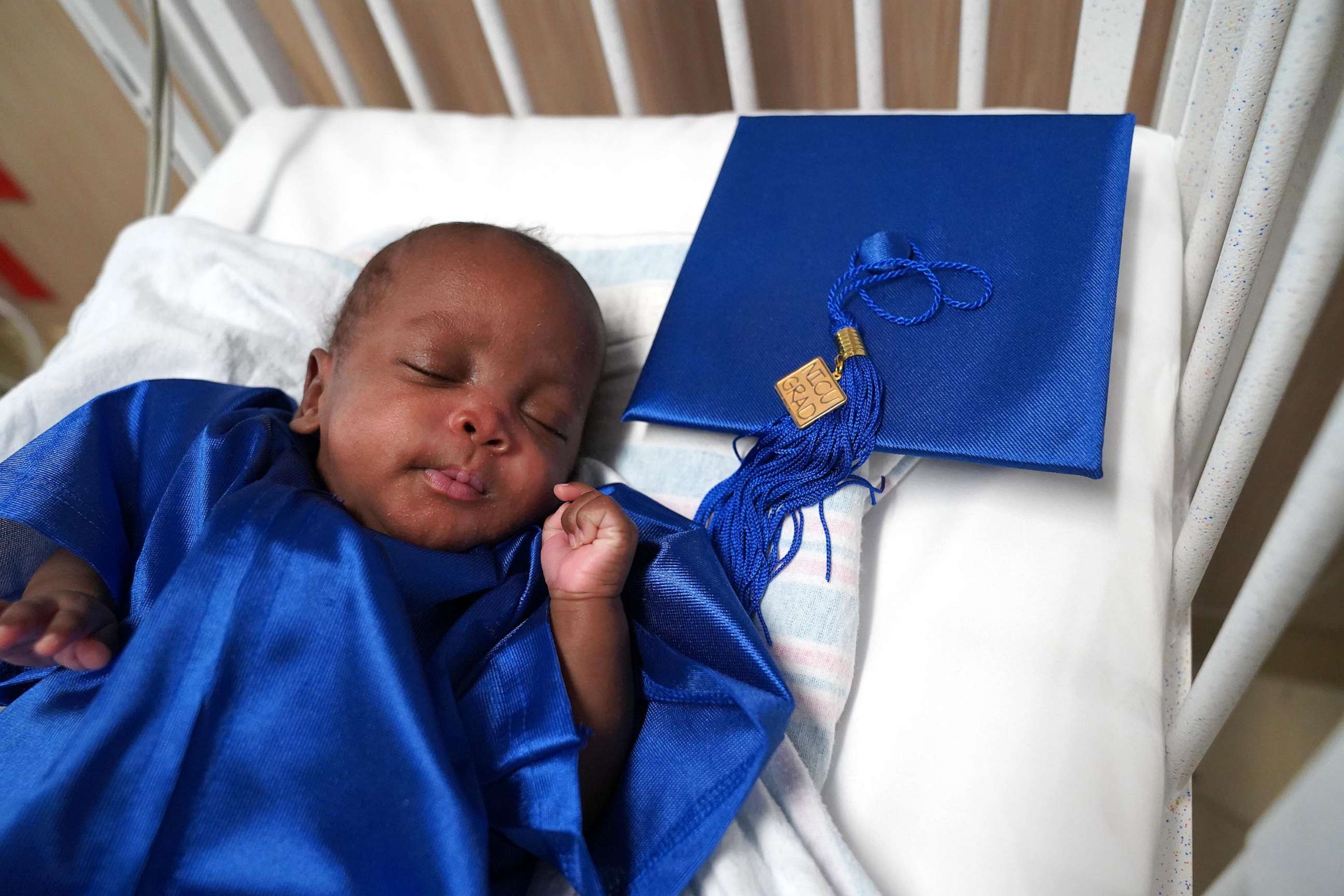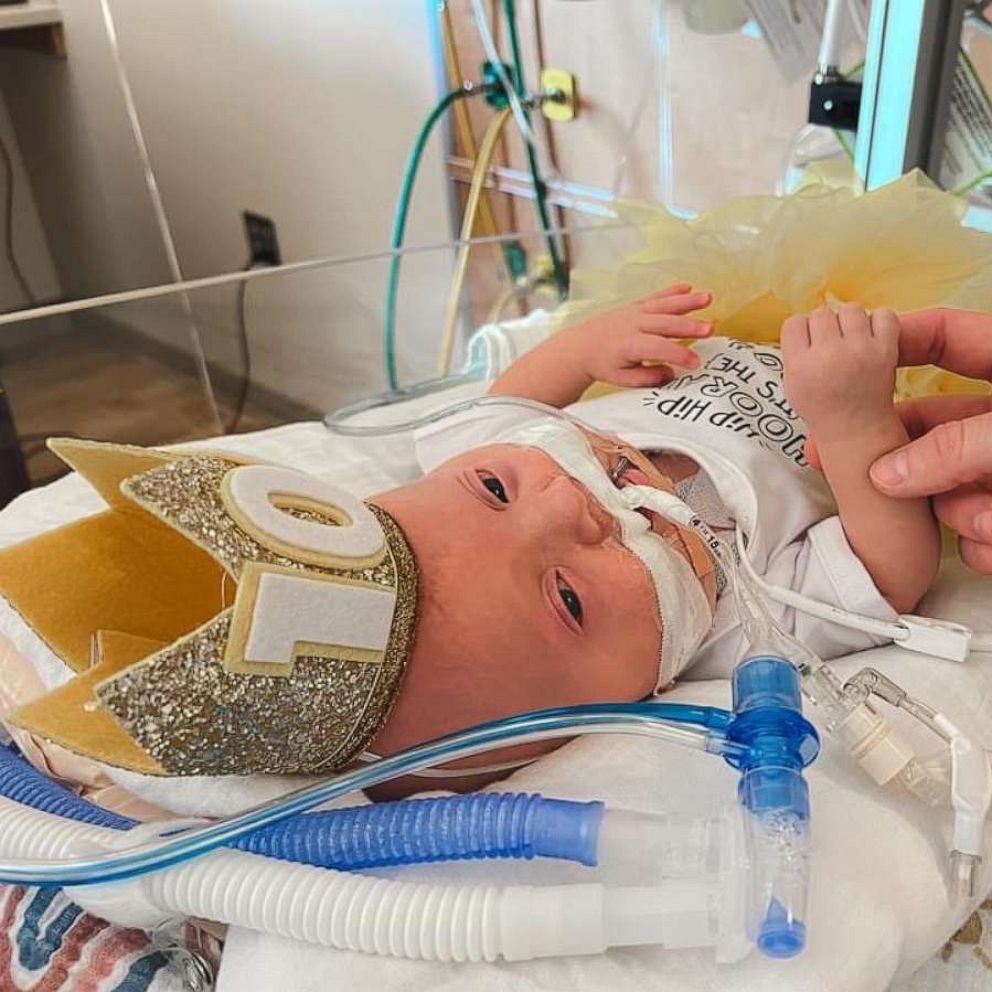Baby born at 23 weeks graduates from hospital NICU after 170 days
Alanie weighed just 1 pound, 1 ounce when he was born last November.
A baby boy who was born at 23 weeks has overcome the odds and graduated from a Florida hospital's nenonatal intensive care unit.
After 170 days at Broward Health Medical Center in Fort Lauderdale, Florida, baby Alanie is now back home with his parents in St. Thomas, in the U.S. Virgin Islands.
Alanie's mother, Graysel Stuart, said when she and her son finally got to leave the hospital, it was almost hard for her to believe.
"To me, it felt like OK, this is too good to be true. What else can happen to prevent us from coming home? But nothing happened," Stuart told "Good Morning America" from St. Thomas.

"I was just overwhelmed with joy and just ready -- ready to come back home to see my family so that he can also meet his family, since I didn't really have any family members come to see me. So, I was happy to bring him [here] to see them."
Stuart told "GMA" she had to travel to Fort Lauderdale after she was transferred from a local St. Thomas emergency room to Broward Health last November.
"I went in to do an ultrasound to find out the [baby's] gender and while [they were] looking, they noticed that my cervix was opening. So they contacted my doctor and then he told me to go to the hospital. They were waiting for me," Stuart recalled.
Stuart said she later learned she had cervical incompetence, where the cervix opens too early, and underwent a treatment called cervical cerclage to have her cervix stitched closed. However, she said her cervix started opening again, and her care team in St. Thomas contacted Broward Health to get Stuart and her baby further care.
"They decided, OK, I may be at risk for early labor. So, they contacted Broward Health Medical Center and they said they are open to taking me," Stuart said. "I left St. Thomas Sunday and I had Alanie on Wednesday."

Alanie was born weighing 1 pound, 1 ounce, on Nov. 30, after which Dr. Johny Tryzmel, a neonatologist and the medical director of the NICU at Broward Health, began seeing and caring for him.
Over the course of the next 5 1/2 months, Alanie had to receive various treatments. He was on a ventilator for a month and received steroids for his lungs. He had stage two retinopathy of prematurity, a condition affecting his eyes, and also had a stage one brain bleed and infections such as a urinary tract infection and a respiratory infection, Stuart said.
Tryzmel said for extremely premature babies like Alanie, who was born at 23 weeks, the chance of survival ranges, but is usually less than 50%. He said he estimated Alanie was closer to the lower 30 percentage range.
"You're talking about a baby that the chances for survival were in the 30%, to say in the best case scenario, around that 30%, 40% -- and [he] beat the odds," Tryzmel said.
Although the odds were low, Alanie grew and made progress, responding well to different treatments.
"Every member of the team is actually the reason why he's doing so well," Tryzmel said. "But you know what's also important in this team? Mommy. She was amazing. She was there every single day. … We want the parents to be part of the team and be part of our everyday plan of care, and she was there every day."

Stuart said she stayed with Alanie full time, while Alanie's father Alvon Lettsome would come to visit for a week at a time every month while they were in Florida. She said the nurses in the NICU became family to her and Alanie.
Tryzmel agreed, saying the care team treated Stuart and Alanie as family members too.
"I was depressed for a while. But having that support system made it easier for me," Stuart said, adding that it was "really hard" and a "very long journey."
"You need to find a way to just let everything go. For me, it was walks, scrapbooking, or just going to the bathroom and just letting everything out or writing the feelings or emotions in a book and just throwing it away. You know, just do what you gotta do to let those feelings out, because it's not good for you and it's not good for the baby."
Today, Alanie is 6 months old. Stuart said he currently needs repeated injections for a condition called neutropenia, a condition where the body doesn't have enough neutrophils, a type of white blood cell. These injections help boost the cell counts, and in the meantime, Stuart said she mostly tries to keep him home to prevent infections.

"My job is to protect him and that's what I will do," Stuart said.
Despite all Alanie has gone through in the last six months, Stuart said her son is "very good" now.
"He loves to smile. He loves to laugh," Stuart said, adding that Alanie is "very nosy" and "loves the camera."
Tryzmel also says he thinks Alanie's future looks bright.
"I don't see why not, one day he actually can be a neonatologist," the veteran neonatologist joked.
Stuart said she wanted to share her son's story publicly to give other NICU families hope.
"I decided to share because there are probably other families that's going through the same thing, and I wanted to be an inspiration to others, to let them know that, you know, don't give up. I know, things are very, very hard. This is not what you imagined for the baby to go through, for your pregnancy to go through -- just don't give up. Have faith," she said.
For her baby boy, Stuart also wanted to share a message of strength.
"You've been through a lot, so I know you're here for a reason," the loving mom said. "You've overcome every obstacle thrown at you and … I hope you know how special you are."







